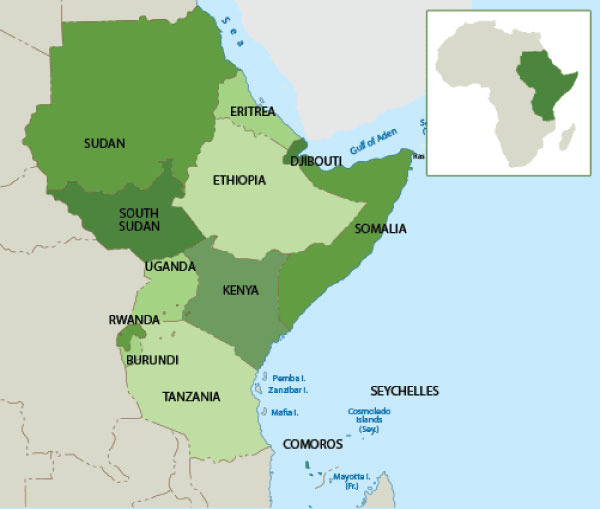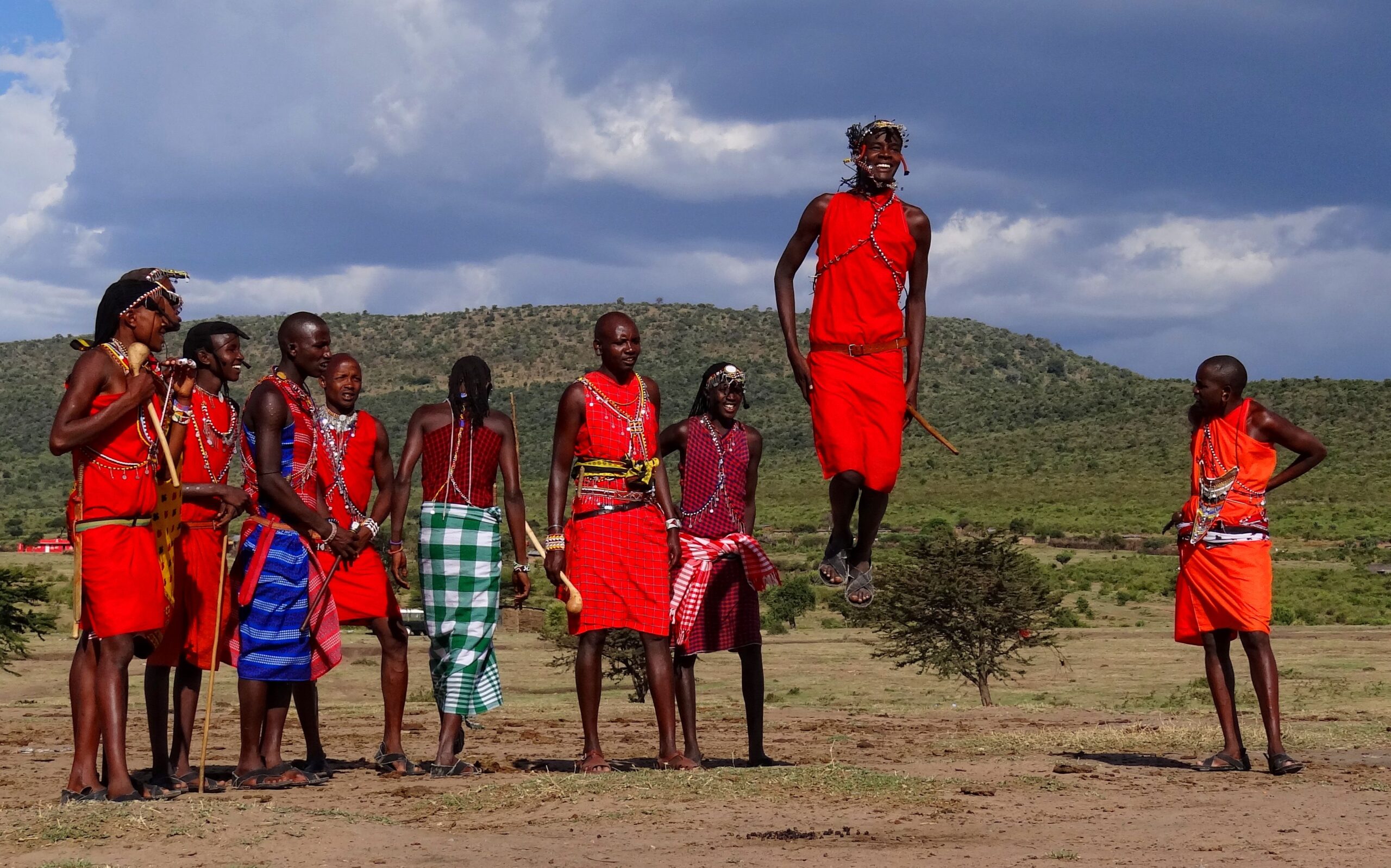Kenya
Wildlife and Conservation Efforts
Kenya is renowned for its wildlife conservation efforts. The country has numerous national parks and reserves dedicated to protecting its rich biodiversity. The Kenya Wildlife Service (KWS) plays a crucial role in managing these areas and ensuring the conservation of species such as elephants, lions, and rhinos. Community-based conservation programs are also essential in promoting coexistence between wildlife and local communities.
Cuisine
Kenyan cuisine is diverse and reflects the country’s ethnic diversity. Popular dishes include
- Nyama Choma: Grilled meat, often served with kachumbari (a tomato and onion salad).
- Ugali: A staple made from maize flour, commonly served with meat or vegetable stews.
- Samosas: Deep-fried pastries filled with spiced meat or vegetables.
Festivals and Events
- Maasai Mara Wild Beast Migration (July-October): An annual event where millions of wildebeest and zebras migrate across the Maasai Mara and Serengeti.
- Nairobi International Trade Fair: Showcases Kenya’s agricultural and industrial products.
Tanzania
Unique Natural Features
Tanzania’s natural features are diverse and include
- Great Rift Valley: A geological formation that runs through Tanzania, creating stunning landscapes and fertile lands.
- Zanzibar Archipelago: Comprising Zanzibar, Pemba, and several smaller islands, known for their pristine beaches and historical significance.
Local Culture and Traditions
- Swahili Coast: The coastal region, especially Zanzibar, is famous for its Swahili culture, a blend of African, Arab, and Persian influences.
- Ngoma Dance: Traditional dance performed by various ethnic groups, often during celebrations and ceremonies.
Sustainable Tourism
Tanzania promotes sustainable tourism practices to protect its natural resources. Efforts include eco-lodges, wildlife corridors, and community-based tourism projects.
Uganda
Ecotourism and Conservation
Uganda’s commitment to ecotourism and conservation is evident in its numerous protected areas and efforts to protect endangered species
Mountain Gorilla Conservation
The country is home to over half of the world’s mountain gorillas, with initiatives focusing on their protection and habitat preservation.
Queen Elizabeth National Park
Known for its diverse ecosystems and the unique tree-climbing lions.
Traditional Music and Dance
Uganda’s cultural heritage is expressed through traditional music and dance
- Amadinda: A traditional xylophone played by the Baganda people.
- Ekizino: A traditional dance performed during cultural festivals and ceremonies.
Rwanda
Environmental Initiatives
Rwanda is renowned for its environmental initiatives and efforts to become a green economy
- Gorilla Naming Ceremony (Kwita Izina): An annual event where newborn mountain gorillas are named, celebrating conservation successes.
- Plastic Bag Ban: Rwanda implemented one of the strictest plastic bag bans in Africa to reduce environmental pollution.
Art and Crafts
- Imigongo Art: Traditional Rwandan art made from cow dung and natural pigments, known for its geometric patterns and vibrant colors.
- Kitenge Fabric: A brightly colored fabric used for traditional clothing and crafts.
Ethiopia
Historical and Cultural Heritage
Ethiopia’s rich history and cultural heritage are reflected in its ancient landmarks
- Aksum Obelisks: Ancient structures that mark the site of the Aksumite Empire, known for its monumental stone carvings.
- Lalibela Rock-Hewn Churches: Carved out of solid rock, these churches are a testament to Ethiopia’s historical Christian heritage.
Unique Festivals
- Timkat (Epiphany): Celebrated in January, it marks the baptism of Jesus and is known for its vibrant processions and religious ceremonies.
- Meskel Festival: Celebrated in September, it commemorates the finding of the True Cross by Queen Helena.
Somalia
Traditional Culture
Somalia has a rich tradition of poetry, storytelling, and music
- Somali Poetry: An important part of Somali culture, reflecting social issues, history, and personal experiences.
- Traditional Music: Includes instruments like the oud and drum, often used in celebrations and storytelling.
Coastal Attractions
- Berbera: Known for its historical significance and beautiful beaches.
- Somalia’s coastline: Offers opportunities for snorkeling and diving with its diverse marine life.
South Sudan
Natural Resources and Challenges
South Sudan is rich in natural resources, particularly oil, but faces challenges related to political instability
- Oil Reserves: The country has significant oil reserves that play a crucial role in its economy.
- Peace and Development Efforts: Ongoing efforts are focused on achieving stability and promoting economic development.
Cultural Diversity
South Sudan is home to numerous ethnic groups, each with distinct traditions and languages
- Dinka and Nuer Cultures: Known for their unique customs, including traditional dress and ceremonies.
Burundi
Agricultural Economy
Burundi’s economy relies heavily on agriculture, with coffee and tea being key exports
- Coffee: Burundi produces high-quality Arabica coffee, which is a major export product.
- Tea: The country also grows tea, which is a significant part of its economy.
Cultural Heritage
- Traditional Dance: Includes performances such as the drum dance, which is an integral part of Burundian culture.
- Gishora Drum Sanctuary: Preserves traditional drumming practices that are central to the country’s cultural identity.
Djibouti
Strategic Location
Djibouti’s strategic location at the crossroads of the Red Sea and the Gulf of Aden makes it a key maritime hub
- Port of Djibouti: One of the busiest ports in Africa, serving as a gateway for international trade.
- Geopolitical Importance: The country hosts several international military bases due to its strategic location.
Cultural Influences
- Afar and Somali Cultures: Djibouti’s culture is influenced by its Afar and Somali populations, reflected in its cuisine, music, and festivals.
Eritrea
Historical Significance
Eritrea’s history is marked by its ancient civilizations and colonial past
- Keren: Known for its historical buildings and significant role during the Italian colonial period.
- Asmara: Renowned for its Italian colonial architecture and vibrant café culture.
Tourism and Development
- Tourism: Focuses on showcasing the country’s diverse landscapes, from its coastal areas to its highlands.
- Development Projects: Efforts are underway to develop infrastructure and boost the economy, particularly in tourism and agriculture.
Additional Information
East Africa’s Natural Wonders
- Great Rift Valley: A geological marvel stretching from the Middle East to Mozambique, with unique ecosystems and landscapes.
- Lake Victoria: The largest lake in Africa, shared by Kenya, Tanzania, and Uganda, and a crucial resource for millions of people.
Regional Cooperation
East African countries are part of the East African Community (EAC), a regional intergovernmental organization promoting economic integration, trade, and cooperation among member states.
Health and Safety
Travelers to East Africa should be aware of health considerations such as malaria prevention and necessary vaccinations. It’s also advisable to check travel advisories for updates on safety and security.
Conclusion
East Africa is a region of extraordinary diversity, from its landscapes and wildlife to its cultures and histories. Each country offers unique experiences and attractions, contributing to the rich tapestry that defines East Africa. Whether exploring ancient sites, enjoying breathtaking natural beauty, or immersing oneself in vibrant cultures, East Africa has something for every traveler.
What is East Africa famous for?
East Africa is renowned for its stunning natural landscapes, including the Serengeti National Park and Mount Kilimanjaro. It is also famous for its rich cultural heritage and diverse wildlife, including the Great Migration of wildebeest and zebras.
What is the largest country in East Africa?
Tanzania is the largest country in East Africa by land area. It covers approximately 945,000 square kilometers, making it the most expansive country in the region.
What is the largest group in East Africa?
The Bantu ethnic group is the largest in East Africa. This group includes various sub-groups such as the Kikuyu in Kenya, the Baganda in Uganda, and the Chaga in Tanzania.
What is the smallest East African country?
The smallest country in East Africa is Burundi, with an area of about 27,834 square kilometers. Despite its size, Burundi has a rich cultural heritage and significant natural beauty.
What is the capital city of East Africa?
East Africa does not have a single capital city as it is a region comprising multiple countries. However, Nairobi, the capital of Kenya, is often considered a central hub for the region due to its political and economic significance.
What is the youngest country in East Africa?
South Sudan is the youngest country in East Africa. It gained independence from Sudan on July 9, 2011, following a referendum in which the majority of South Sudanese voted for independence.
What is the richest country in Africa?
Nigeria is considered the richest country in Africa based on its Gross Domestic Product (GDP). It has a large and diverse economy, largely driven by its oil and gas sector.
What is the largest city in Africa?
Lagos, Nigeria, is the largest city in Africa by population. It is a major financial center and one of the most rapidly growing cities on the continent.
Which country is highly populated in East Africa?
Ethiopia is the most populous country in East Africa, with a population exceeding 120 million people. Its large population contributes to its significant cultural and economic influence in the region.
What is the poorest country in Africa?
Burundi is often cited as one of the poorest countries in Africa based on GDP per capita. Despite its challenges, the country has rich cultural traditions and natural resources.
- These Ancient Archaeological Finds Changed History! - August 20, 2024
- The Secrets Of Ancient Egypt! - August 19, 2024
- The Great Abandoned Iberian City Of Ullastret! - August 18, 2024



